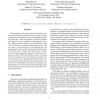Free Online Productivity Tools
i2Speak
i2Symbol
i2OCR
iTex2Img
iWeb2Print
iWeb2Shot
i2Type
iPdf2Split
iPdf2Merge
i2Bopomofo
i2Arabic
i2Style
i2Image
i2PDF
iLatex2Rtf
Sci2ools
SBRN
2008
IEEE
2008
IEEE
Using a Probabilistic Neural Network for a Large Multi-label Problem
The automation of the categorization of economic activities from business descriptions in free text format is a huge challenge for the Brazilian governmental administration in the present day. When this problem is tackled by humans, the subjectivity on their classification brings another problem: different human classifiers can give different results when working on a set of same business descriptions. This can cause a serious distortion on the information for the planning and taxation of the governmental administrations on the three levels: County, State and Federal. Furthermore, the number of possible categories considered is very large, more than 1000 in the Brazilian scenario. The large number of categories makes the problem even harder to be solved, as this is also a multi-labeled problem. In this work we compared the multi-label lazy learning technique, MLKNN, to our Probabilistic Neural Network approach. Our implementation overcome the ML-KNN algorithm in four metrics typical...
Artificial Intelligence | Brazilian Governmental Administration | Business Descriptions | Governmental Administrations | SBRN 2008 |
Related Content
| Added | 01 Jun 2010 |
| Updated | 01 Jun 2010 |
| Type | Conference |
| Year | 2008 |
| Where | SBRN |
| Authors | Elias Oliveira, Patrick Marques Ciarelli, Alberto Ferreira de Souza, Claudine Badue |
Comments (0)

